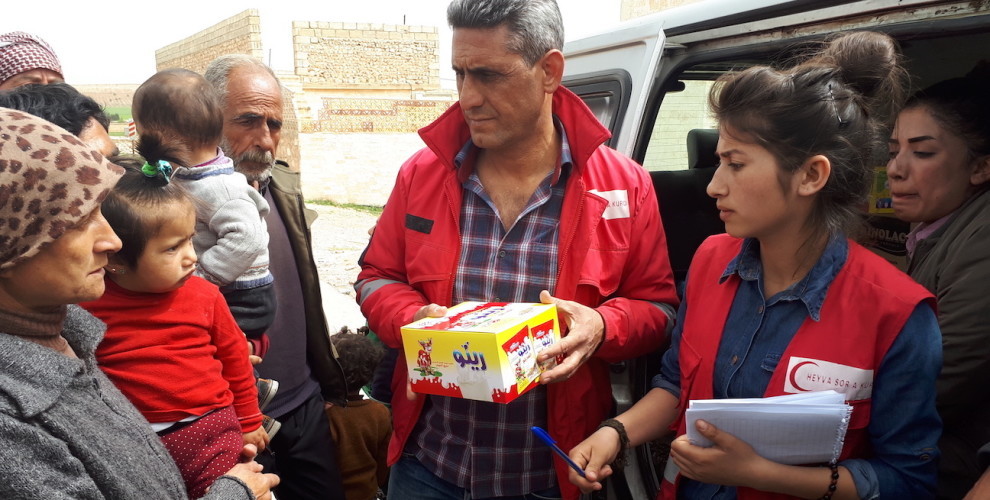After the government of Afrin took the decision of removing the people from the city faced by the brutal attacks of the Turkish state, hundreds of thousands continue to resist despite the difficult conditions they face in Shehba and Shêrawa.
The hundreds of thousands of Afrin citizens who had to leave the city in the wake of the Turkish occupation have found great support from Heyva Sor A Kurd (Kurdish Red Crescent), the organization born out of the Kurdish people.
Heyva Sor A Kurd is working around the clock to secure aid and primary care to the displaced citizens despite the many restrictions and difficulties and is getting support from abroad as well as from the four parts of Kurdistan.
Heyva Sor A Kurd works around the clock to secure first aid
It is with this spirit of mobilisation and urgency that Heyva Sor A Kurd provides first aid, health and medical support to people of Afrin, as well as food, water, clothes, and all basic needs.
Many of the ambulances and Heyva Sor A Kurd stuff who had been targeted during the attacks previous to the occupation of Afrin, are now deployed in the Shehba district. Heyva Sor A Kurd representatives spoke to ANF about their services, activities and basic needs.
Afrin had been welcoming war migrants since the beginning of the war in Syria
Commenting on the work they are carrying out, Emre Mihemed, a physician from the office of Heyva Sor A Kurd in Afrin, said that in fact Afrin had been receiving migrants and refugees not just prior to the Turkish invasion but indeed from the very beginning of the Syrian war. Emer remarked that Afrin has welcomed hundreds of thousands of migrants in the last seven years and said: "We had two camps in Afrin: Shehba and Rubar and we have been working with refugees and displaced people for many years now. This is not something we are not used to.”
Seven health centres have been set up
As the attacks by the Turkish state begun, said Mihemed, “we have been working and trying providing the civilian population anything they needed”.
Now, the doctor said, “we continue to carry out our work in the Shehba region and after our people have left Afrin, we have already set up 7 health centres: 2 in Shêrawa and 5 in Shehba. We are working non-stop despite the difficulties and shortages."
All activities are recorded
Mihemed said that they provided health care services to an average of 400 people per day at the 7 centres they have set up. All aids and supplies that arrive to Heyva Sor are being recorded and distributed through specially set up committees that have the duty to record every activity being carried out. Mihemed said: "We have organised ourselves in committees here. We have created committees for various areas of concern, like health, children's milk, food and housing, and we are trying to provide support to our people through a strict division of labor."
No aid from international agencies
Pharmacist Rim Karho, who is part of the administration body of Heyva Sor A Kurd office in Afrin, underlined that the people had been through a really tough time. “It is in these difficult times, - Karho said - that Heyva Sor tried to offer all kinds of support and assistance”. Underlying that they are working also thanks to the aid and support coming from other parts of Europe and Kurdistan, Rim Karho confirmed they had not received any support from international aid agencies.
No surgery can be performed
Rim Karho underlined that people who migrated from Afrin had not been able to take anything with them when they left their homes and added: "Our people here are living in the ruins of houses, in tents, often on mined lands. Children especially suffer from shortage of water and there are a lot of cleaning problems”.
Karho also confirmed that “We will face more serious problems once the air gets warmer and we cannot provide many health services because all our surgical instruments and medicines have remained in Afrin. Our hospital there was bombed. We are unable to do any surgical intervention. In the past days two children have been wounded when they stepped on a mine. One was 17 and the other 14. We could not perform surgery and only after a very long procedure we were finally able to send them to Zehra region."
250 thousand people and no hospital
Rim Karho made a final sad comment: "There are more than 170 thousand people from Afrin here. Yet Shebha has around 80 thousand citizens itself. It means there are now in this area some 250 thousand people and no hospital. We are working around the clock to build an emergency hospital but our resources are very limited”. That is why Rim Karho repeated the call to the World Health Organisation and to any organisation and group willing to help, to act fast.















